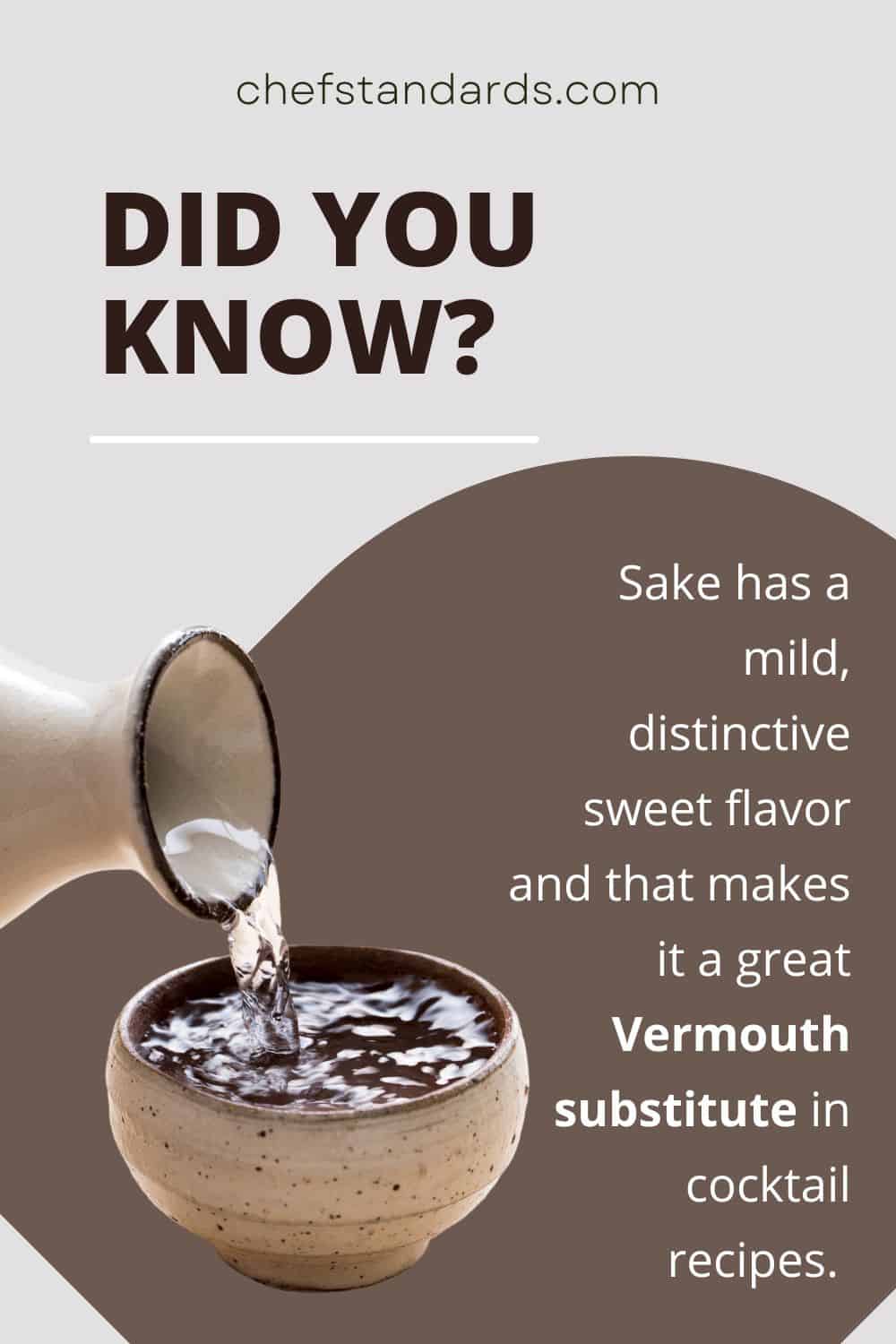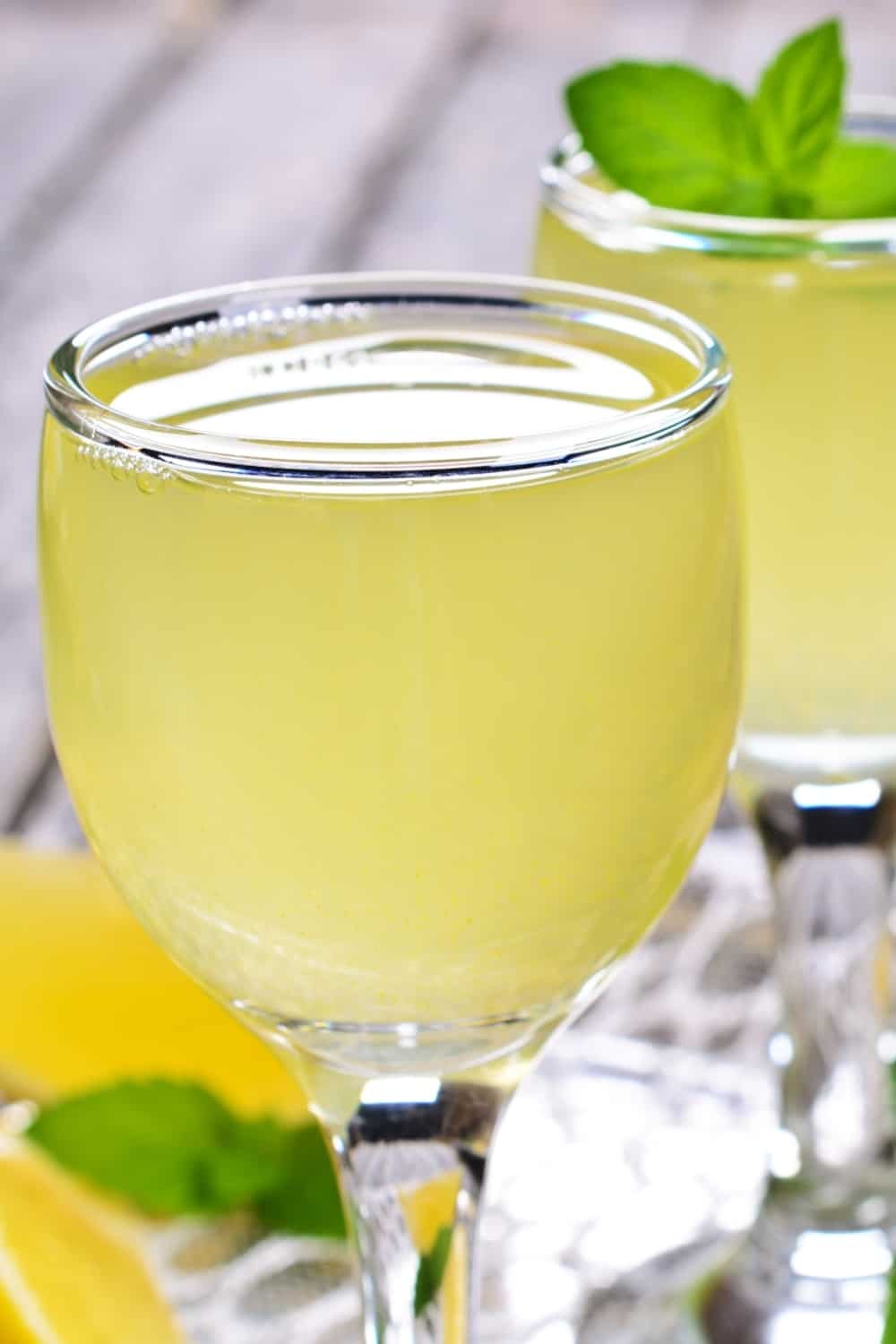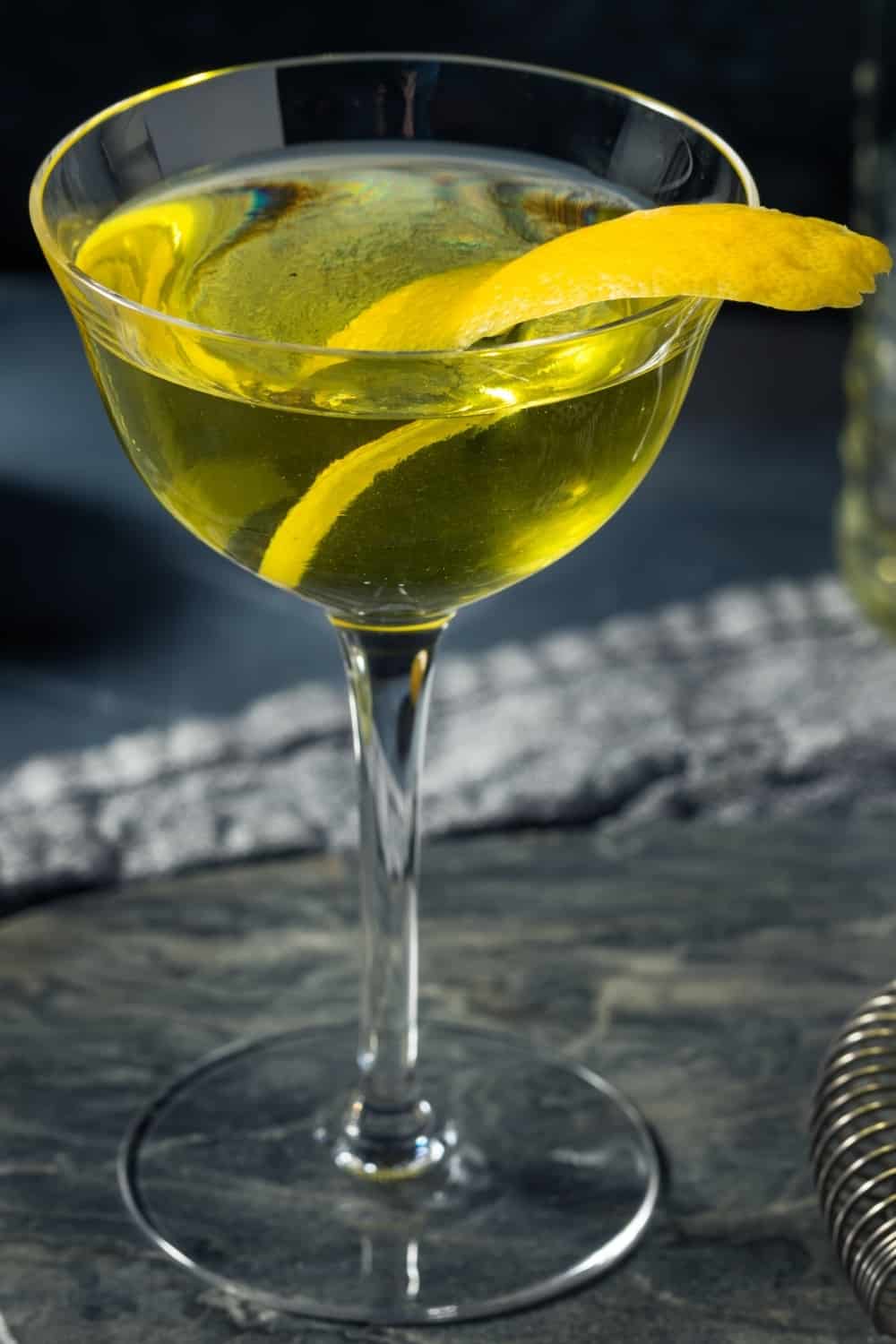Vermouth is a classic among many cocktail lovers because its versatility is unlimited in the world of cocktails.
However, vermouth can also be enjoyed on its own and even be added to various types of dishes in the cooking process.
If you didn’t know, vermouth is actually a fortified wine enriched with various types of spices, herbs, and roots that provide it with a complex flavor profile.
The exact flavor profile depends on the specific type of vermouth. While dry vermouth has a subtle sweetness and a slightly bitter finish, sweet vermouth is a combination of more pronounced sweetness and a fuller body.
In this article, we will try to find the best vermouth substitutes that may resemble these trades of both dry and sweet vermouth.
So, let’s see what those alternatives have to offer, starting with substitutes for dry vermouth.
The List Of 6 Best Dry Vermouth Substitutes
As I already mentioned in the introduction part, the exact flavor profile of vermouth depends on its type. So, although similar, substitutes for dry and sweet vermouth are not the same. Let’s take a look at the first alternative for dry vermouth.
1. White Wine

Since vermouth itself is a fortified wine, it is no surprise that its best substitute is wine. What’s more, the base of vermouth is actually white wine as well. That makes white wine even more suitable.
Although the exact flavor profile of wine can vary greatly depending on the type of grapes as well as the winemaking process, white wine in general is lighter in body than red wine which makes it more suitable for substituting dry vermouth.
Also, the flavor of white wine can range from dry to sweet and, when searching for a vermouth substitute, you will always look for the drier variety.
If you find a suitable type of dry wine, you will be able to use it in a martini cocktail instead of a vermouth.
Aside from that, white wine can successfully substitute vermouth in cooking.
For example, risotto is a type of dish that can call for dry vermouth in some recipes.
And, if you don’t have any vermouth, dry white wine can easily replace it and enrich the flavor profile of this creamy Italian dish.
If you decide to use white wine in the recipe, use a bit more of it because it doesn’t have the intense flavor of vermouth. If you are concerned about alcohol content, just let it simmer a little longer and the excess alcohol will evaporate.
2. Lillet Blanc
If you are looking for a vermouth substitute in your cocktail, Lillet blanc might be your best bet.
It is a fortified wine mixed with liqueurs, fruits, and herbs and it originated in France. More precisely, it is a French aperitif produced in the late 19th century in the town of Podencas in the Bordeaux region of France.
It is only one of the three varieties of Lillet alongside Lillet Rose and Lillet Rouge. But, because of its refreshing, light taste with delicate citrus notes, Lillet Blanc is the best vermouth alternative.
That is especially true when you want to use it instead of vermouth in cocktails that are light, refreshing, and citrusy.
One of the most popular types of cocktails that incorporates Lillet Blanc is definitely Vesper Martini.
It is a cocktail from the famous James Bond novel, “Casino Royale”, and it is a combination of Lillet Blanc, gin, and vodka.
Some other popular cocktails with Lillet Blanc include Lillet G&T, Lillet Spritz, and The Adonis.
3. Dry Sherry

It is also a fortified wine that originated in the Jerez region of Southern Spain. Dry sherry is definitely one of the most popular fortified wines in the world.
It is made from the Palomino grape that is fortified with grape spirit, which makes it higher in alcohol content (around 15-20% ABV).
Aside from alcohol content, the distinctive nutty and savory flavor also sets it apart from the other types of fortified wines.
Here, I have to emphasize that the exact flavor profile of dry sherry depends on its age. Dry types include manzanilla and fino and those are light-bodied and have a very dry, crisp taste.
Two other types include amontillado and oloroso and those types are darker and richer in body with a more complex flavor.
Since we are in search of dry vermouth substitutes, it is obvious that the first two options are more suitable.
This versatile drink can be enjoyed on its own, or it can be added to various types of cocktails including Bamboo, Tuxedo, Sherry cobbler, and Sherry flip.
Since it isn’t sweet at all, it is always better to add it to cocktails that are already on the sweeter side.
It is also a popular ingredient in cooking because it adds a rich flavor without making it too sweet.
4. Sake
If you are into beverages, you surely know what sake is. For those of you who don’t know about this amazing alcoholic drink, sake is the national beverage of Japan and it is made as a brewed alcohol from polished white rice, water, yeast, and koji.
It has a similar alcohol content than wine and it ranges from 15-20% AVG. Its flavor profile ranges from light and floral to rich and earthy, depending on the specific type and style.

However, in general, sake has a mild, distinctive sweet flavor and that makes it a great Vermouth substitute in cocktail recipes.
Among many different cocktails in which sake thrives, some of the most popular ones include Sake Martini, Sake Sour, Sake Margarita, and Tokyo Mule.
Aside from cocktail recipes, this incredible Japanese beverage can also be used in cooking to add more flavor and complexity to the dish.
It works best in various sauces, salads, soups, broths, and stir-fries.
5. White Wine Vinegar
One of the main traits of every type of vinegar is certainly its acidity. Exactly because of that characteristic, vinegar is considered a good substitute for vermouth.
Of course, you won’t drink vinegar alone instead of vermouth, but you can use it in cooking, in various types of dishes, from salads to more complex dishes like paella, for example.
But, there are a lot of types of vinegar out there, so it is important to know which type is suitable to successfully replace vermouth in a certain dish.
The most obvious choice is wine vinegar since vermouth itself is a type of fortified wine.
And since we are talking about dry vermouth substitutes, it is logical to conclude that we will choose white wine vinegar because white wine is lighter in body than red wine.
When it comes to types of dishes in which you can use white wine vinegar as a vermouth substitute, those include seafood dishes, vegetable dishes, chicken and pork dishes, as well as various types of sauces.
When substituting, you can freely use a 1:1 ratio.
One more note. Apple cider vinegar and rice vinegar can also be decent substitutes for vermouth because they have similar levels of acidity. You can use them in the same amount in your dish as well.
See Also: 8 Key Differences Between White Vinegar Vs White Wine Vinegar
6. Lemon Juice

Finally, there is one substitute in the form of natural juice that comes directly from the fruit that starts with l.
It is the juice of the famous citrus known as a lemon. You may be wondering why lemon juice can serve as a good substitute for vermouth.
Well, since vermouth is a fortified drink, it becomes a bit thicker, but also a bit more acidic. And we all know that the trademark of lemons is their acidity.
But, it should also be emphasized that lemon juice can not be used everywhere as a substitute. You certainly won’t serve lemon juice alone at the party as a vermouth substitute, right?
But, in the world of cooking, lemon juice can be a decent alternative. It is most commonly used in sauces for meats and pasta.
If you decide to use lemon juice in one of these dishes, use half a cup for every cup of vermouth so that your dish doesn’t end up being too acidic.
And because of that, it is not recommended to use some other types of citrus fruits, especially limes, because their flavor is too overwhelming.
The List Of 6 Best Sweet Vermouth Substitutes
As you already know, although similar in almost every trade, dry and sweet vermouth has some differences in flavor profiles, so it is important to explore the substitutes for both of these main types of vermouth.
1. Sweet Red Wine

If you read the first part of the article, i.e. the list of dry vermouth substitutes, you were able to see that the first item on the list is white wine, more precisely dry white wine.
Of course, the best dry vermouth substitute needs to be wine, as well as dry and light in body.
Following this logic, it is not hard to conclude that the best substitute for sweet vermouth also needs to be wine, but heavy in body, and sweeter as well.
And there is no better candidate for this role than sweet red wine itself. It is also acidic, just like vermouth, but it has those sweet notes that perfectly resemble the notes of sweet vermouth.
Some types of popular sweet red wines include Lambrusco, Vin Santo Rosso, Rosso Dolce, and Ruby Port.
You can enjoy these fine wines on their own, or you can pair them with some other food like some rich chocolate torte or some meaty feasts.
Take note that these full-bodied wines are high in alcohol (15% ABV or more), so you should pay more attention when counting the glasses you consume.
2. Dry Red Wine + Simple Syrup
When you don’t have any sweet vermouth on hand, nor sweet wine or some other similar beverage, the only thing left is to experiment.
So, if you are in possession of dry wine and have some simple syrup in the pantry as well, you could mix those two ingredients to produce a decent substitute for your sweet vermouth.
Dry wine has a decent amount of acidity to replicate sweet vermouth, but it lacks sweetness.
Simple syrup is a simple combination of water and sugar that has a good amount of sweetness. When that sweetness is added to the acidity of dry red wine, a decent vermouth substitute is created.
Simple syrup is mostly used in various types of cocktails for the additional sweet flavor, but when you mix it with dry red wine, it can easily replace sweet vermouth in almost any type of cocktail.
You should, however, take note that there are some disadvantages to this alternative considering the different flavor profiles and the fact that simple syrup lowers the amount of alcohol in red wine.
Considering this, you will probably have to experiment a little until you achieve the desired flavor and alcoholic content.
3. Port Wine

If you are a wine lover and if you’ve ever been to Portugal, you certainly are familiar with Port wine.
It is one of Portugal’s most popular fortified wines that originates from the Douro Valley, northern Portugal.
Port wine is a combination of several different grape varieties, has a deep ruby color, and is a combination of plums and cherry flavors.
Because of the addition of a distilled grape spirit during the fermentation process, it contains residual sugars that result in a much sweeter flavor compared to other types of red wines. So much so that it is often called a dessert wine.
That is a fortune if you are looking for a sweet vermouth substitute because sweet Port wine has a similar level of sweetness.
Ruby port is the best type of Port wine to substitute sweet vermouth in cooking. It has a very similar flavor. Do not fall into the trap of choosing the other popular type of Port wine, Tawny port, because it is often drier and less sweet.
You can also experiment with various types of Port wines in your cocktail recipes. Some popular types of cocktails where you can use Port wine instead of vermouth are Negroni and Manhattan.
One more note. Due to the different fermentation processes, Port wines have a higher alcohol content (19-22% AVG), so you should take that into consideration when sipping it from your wine glass.
4. Amaretto
It is a golden-brown colored liqueur that originates from Italy. Amaretto is one of the most popular liqueurs out there and it can be enjoyed on its own, mixed in various cocktails, and used as an ingredient in different sweet dishes and desserts, like for example as an alcohol in tiramisu.
Because of its sweet flavor, it can be a decent substitute for sweet vermouth, especially in certain types of cocktails.
The most popular cocktail that combines amaretto and sweet vermouth is the Godfather cocktail that has a complex and sweet flavor profile.
Amaretto can also be used in cooking as a decent alternative because it can add a desired sweetness to the dish, just like sweet vermouth itself.
It is mostly used as a substitute in baked dishes like cakes and cookies, but it can also be used in savory dishes including marinades for chicken and meat, dressings for salads, and sauces for pasta dishes.
However, you should also take note that amaretto has a higher alcohol content, as well as a more distinct, nutty flavor.
Because of that, you will probably have to use a lower amount of amaretto in your recipes.
5. Chartreuse

It is another liqueur, but this one comes from France. It is a drink that has been made by famous Carthusian monks in the middle of the 18th century.
It is a complex alcoholic drink that is composed of distilled alcohol with over 100 herbs, flowers, and plants and it comes in green and yellow variations, although the green chartreuse is the most popular type.
This liqueur has a syrupy texture and a very unique and complex flavor profile with notes of various types of herbs and spices.
It also has fairly sweet notes and that is most important when it comes to choosing it as a substitute for sweet vermouth.
Because of that sweet taste and herbal flavor profile, chartreuse can be used in many types of cocktails as a substitute for vermouth.
However, it is advisable to use less than vermouth because it has a stronger flavor and higher alcohol content, especially if you are using green chartreuse that’s alcohol content is about 55% ABV.
See Also: 12 Best Green Chartreuse Substitutes For A Perfect Cocktail
6. Balsamic Vinegar
Wine is made from grapes and vermouth is a type of fortified wine, so you should always look for a substitute that has similar ingredients and where the same processes are used.
Here, we have balsamic vinegar, a type of vinegar that is mostly made from grape must, the same grape juice used for making wine.
Taking all this into consideration, it is easy to conclude why balsamic vinegar is a good substitute for sweet vermouth.
The flavor profile is also key because balsamic vinegar has a decent amount of acidity with complex sweetness and fruity notes.
It is its flavor profile that guarantees this vinegar will be a good substitute for vermouth, especially when cooking.
If you eventually decide to use it, use ⅓ cup and dilute it with ⅔ cup of water for every cup of vermouth required.
You can use it when making marinades, sauces, and salad dressings, as well as some other types of recipes like risotto, pasta, and vegetable dishes.
Did You Find Your Perfect Vermouth Substitute?
No matter what type of vermouth you are trying to substitute, dry or sweet, these vermouth substitutes will help you find the perfect ingredient for your cocktail, as well as sweet or savory dishes.
Some of these alternatives you can also use as an aperitif to enjoy instead of vermouth. You just have to explore them and choose which one suits you the best.

